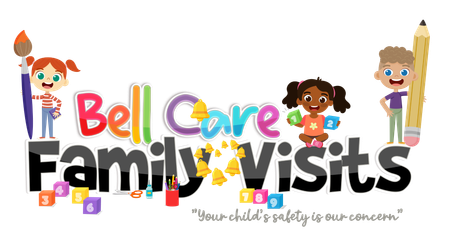
About us
Bell Care Family Visits is a provider of Professional Supervised Visits that are court ordered. We provide visits for Non-Custodial Parents with their child(ren) in the event that allegations of any kind and/or the child's safety was in jeopardy.
The role of our Supervised Provider's is to make sure that every child that's in our care are kept safe and feel protected during the visits. We are present at all times during the visit, are within hearing distance of the Non-Custodial Parent and the child(ren) and monitor the child's behavior closely.
At Bell Care Family Visit we are dedicated to creating a nurturing, stimulating and safe environment for all children.
Bell Care Family Visits
We are a Professional Supervised Visitation Monitoring and Exchange Provider that provides off-site visits.

Our Role
Bell Care Family Visits follow the proper protocol for the safety of the child and parent. "A safe environment ensures a healthy and happy experience for all."
- Maintain confidentiality and neutrality.
- Ensure that the court's directives are followed.
- Monitor safety of all participants at visits.
- Relay relevant information relating to the child's welfare between the custodial parent and the noncustodial parent at the commencement and conclusion of supervised contact.
- Facilitate appropriate visit interaction, if necessary.
- Effectively communicate with program staff on issues related to family dynamics.
- Provide constructive feedback, correction, or redirection to the parties as necessary.
- Testify in formal court hearings, when appropriate.
- Suspend or terminate any visit in which the safety of participants or staff cannot be maintained.

Our Responsibility
Helping families establish better relations and communicate
- Protect the confidentiality of the child and parent who receive program services to the extent required by law.
- To maintain records according to the "Minimum Standards and protecting location information regarding victims of domestic violence and their children.
- Refrain from discussing individual cases except in formal court proceedings, with program staff, or pursuant to program policies with lawyers, social services agencies or parties to the case.
Professional Supervised Monitor Provider
Providers must comply with the court order for the case and are expected to make every reasonable effort to ensure the safety and welfare of the child and adults during visitation. Supervised Visitations Providers are trusted professionals to supervise parent's visits with his or her child or the exchange of the child from the custody of one parent to the other.
Parents trust providers and believe they will look out for their child's health, safety, and well-being. Before the visit the Provider will make sure to:
- Review the court order and parents' intake information.
- Find out about each child's special health needs or medical conditions.
- Know how to contact law enforcement in case of an emergency.
- Speak to each parent to make sure they understand the rules of visitation.
- Explain the visitation rules to the child in age-appropriate language.
- Let the parents know they cannot keep what happens during the visit confidential.
- Providers keep a record of all visits and any communication must be shared with the court if requested, and others as required by law.
- Determine if any othere orders - aside from the court order - apply to the case.
Providers observe, record and report during the visit. The provider is attentive at all times. The Providers remain neutral. Providers will report abuse. Providers make safety a priority. No physical or verbal or non-verbal abuse will be tolerated.
- Providers treat parents and children with respect at all times. Parents have the right to know:
- How services will be provided.
- About the supervised visitation provider's qualifications, training and experience.
- How long they must participate in supervised visitation or exchange services.
- How the supervised provider will help keep them and their child safe during the supervised visit or exchange.
- The costs and fees for supervised visitation or exchanges.
- What type of conduct is expected of them and other parent during the supervised visit or exchange.
- The reason or reasons for ending the supervised visit or exchange.
- The grounds for termination of services by the provider.
- What information should be kept confidential and the exceptions, including how information may be release and disclosed to others.
- that all supervised visitation center staff members or individual professional providers have completed criminal background and fingerprinting clearance.
- The supervised visitiation center staff or individual professional providers have adequate insurance coverage for providing services.
Supervised Visitation
Supervised visitation is defined as contact between a non-custodial party and one and more children in the presence of a neutral third person. Supervised visitation is also known as parent-child contact observed by a supervised visitation provider.
Supervised Exchange
The supervision of the transfer of a child from one parent to another for the purpose of visitation with the non-custodial parent. Supervised exchange is also know as monitored exchange or neutral pick-up and drop-off.
Reason for Supervised Visitation
Designed to protect parent-child contact by having a third person present to monitor the child's contact with a non-custodial parent or to monitor for safety the parent's exchange of the child for visitation.
A judge orders supervised visitation when they beleve it is in the best interest of the child.
A judge may order supervised visitation to give the visiting parent a chance to address specific issues.
Examples include:
- To help reintroduce a parent and a child after a long absence.
- To help introduce a parent and a child when there has been no existing relationship.
- When there is a history or allegations of domestic violence, child abuse and neglect or substance abuse.
- When there is a parental threat of abudction.
The 5 Step Process
1. Referral
- Judge makes a court order for supervised visitation or exchange.
- Parents may receive a referral from an attorney, social worker or someone involved.
2. Intake
- Provider carefully reviews the court order to determine whether or not they can accept the case.
- Providers will not provide services without an order from the court.
- Parents should provide a copy of the court order when requesting services.
3. Orientation
- Provider will have a comprehensive orientation with each parent - separately - and the child.
- Provider will explain the terms of service and make sure all parties are on the same page.
4. Supervised Visit
- During the visit, the provider will monitor the parent-child contact. If the parent does not follow the rules or there is a safety violation, the provider can suspend or terminate the visit.
- If issues arise, the provider may request that one or both of the parents or the child participate in "re-orientation."
5. Report
- Professional provider mus t create a report of what occurred at the visit.
- Provider must provide a copy to either of the parents, their attorneys, the attorney for the child or the court if requested.
- All reports only include facts, observations and direct statements (fod's).
Our Mission
Bell Care Family Visits mission is to create a healthy, safe and nurturing experience for both child and parent during each visit. We recognize the need to establish and to continue a healthy relationship with your child during this difficult time.
We need your consent to load the translations
We use a third-party service to translate the website content that may collect data about your activity. Please review the details in the privacy policy and accept the service to view the translations.

